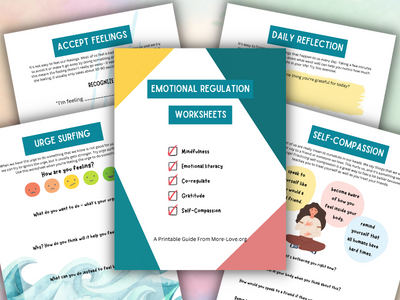
Many of us were raised with the idea, whether expressed or implied, that emotions are a sign of weakness. We were taught to hide “ugly” emotions and regulate out of control happy emotions, which could get unruly and hard to manage for our parents, teachers and caregivers.
But research into Emotional Intelligence and its impact on life suggests that to feel emotions and use them to promote certain behaviors and inform decisions is actually a sign of strength.
Jennifer Rollin, psychotherapist and eating disorder specialist, says that disordered eating behaviors are a way that an individual is trying to meet his or her emotional needs. “Often people use eating disorder behaviors to cope with unpleasant emotions or difficult life circumstances,” she says. “These behaviors may cause people to feel temporarily better in the short-term, but typically lead to greater pain and suffering in the long-term.”
And it’s for this reason that modeling and teaching your child Emotional Intelligence skills can be so valuable. One of the key elements of building Emotional Intelligence is self-awareness, which is the ability to recognize and understand your own emotional state.
You can model this behavior for your child by talking about your own mood states throughout the day.

This is how you can model self awareness for your child:
- Start statements with “I feel …”
- Label the feeling (happy, sad, angry, frustrated, calm, excited)
- Provide the reason why you are experiencing the feeling
- Add the words “right now” to show that you know that mood states and feeling always pass
- If your feeling is based on a mistake that you have made, explicitly remind yourself that mistakes are normal and OK
Emotional Regulation Worksheets
Give these printable worksheets to grow more confident, calm and resilient and feel better, fast!
- Self-Esteem
- Self-Regulation
- Mindfulness
- Calming strategies
Here are some examples:
- I’m so happy right now because it seems like you are a little bit more relaxed about the upcoming Chemistry test. Is there anything else I can do to support you?
- I feel really anxious right now because I have a big project due tonight, and I feel like I should have it already done. I guess I just have to remember that it’s going to take what it’s going to take to finish it up, and then I will feel better.
- I feel so frustrated with myself right now because I forgot to pick up bread at the store, but it’s OK – we all make mistakes. What can we use instead?
Emotions and eating disorders are linked, so your child may be struggling process her emotions in a healthy way. Instead of feeling her feelings, she numbs herself with food or the absence of food. Help her process feelings naturally and without judgement by using the principles of Emotional Intelligence.

Ginny Jones is the founder of More-Love.org, and a Parent Coach who helps parents who have kids with disordered eating and eating disorders. Combining science, compassion, and experience coaching hundreds of families, she helps parents understand what’s going on with their kids’ eating behaviors and teaches them the science-backed skills to heal kids’ relationship with food, improve their body image, and feel better about themselves, their relationships, and life in general.
Ginny has been researching and writing about eating disorders since 2016. She incorporates the principles of neurobiology and attachment parenting with a non-diet, Health At Every Size® approach to health and recovery.
See Our Guide to Emotions And Eating Disorders

Please check out the book Emotional Intelligence: Why It Can Matter More Than IQ
Also check out Daniel Goleman’s Website

